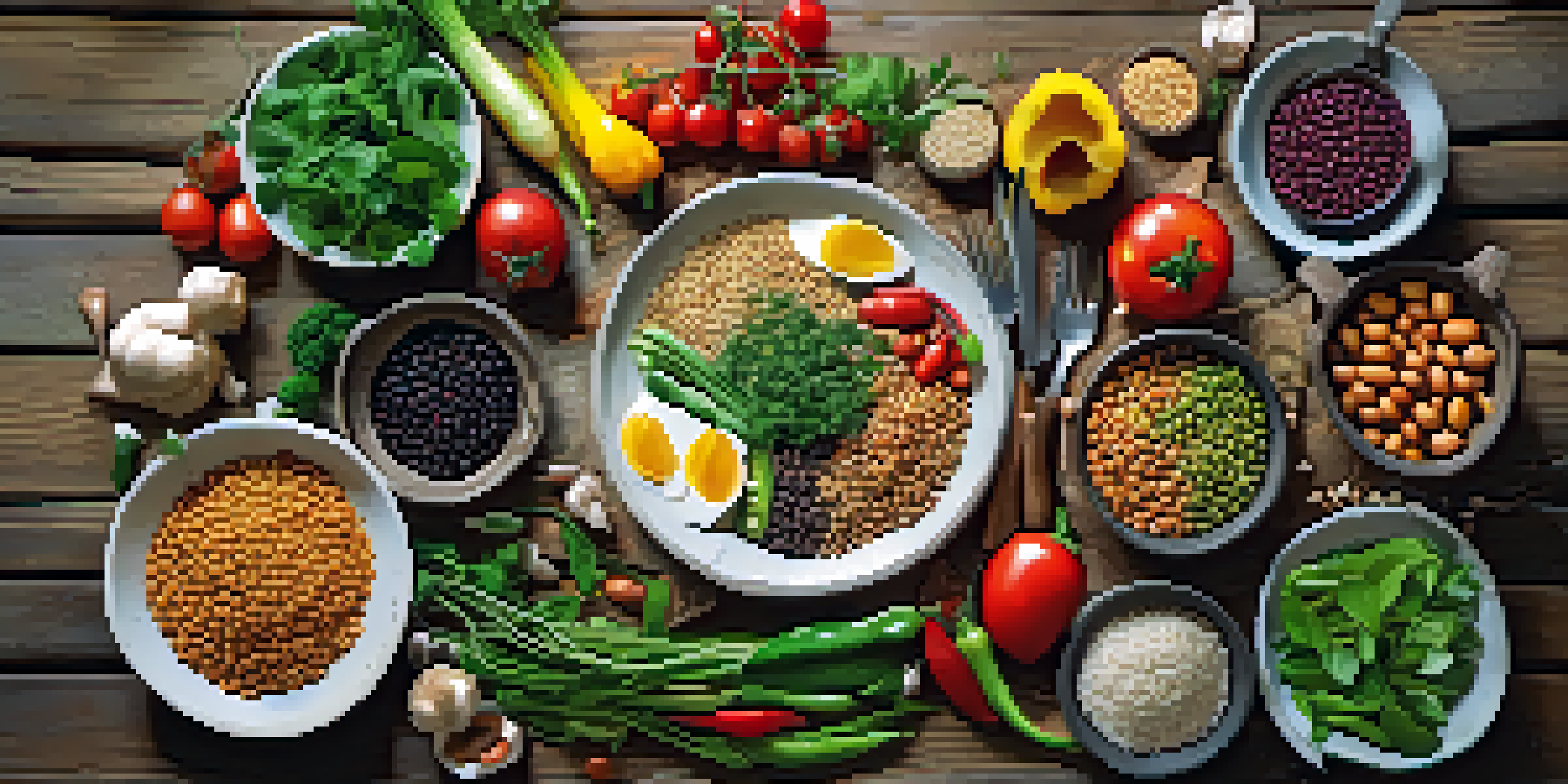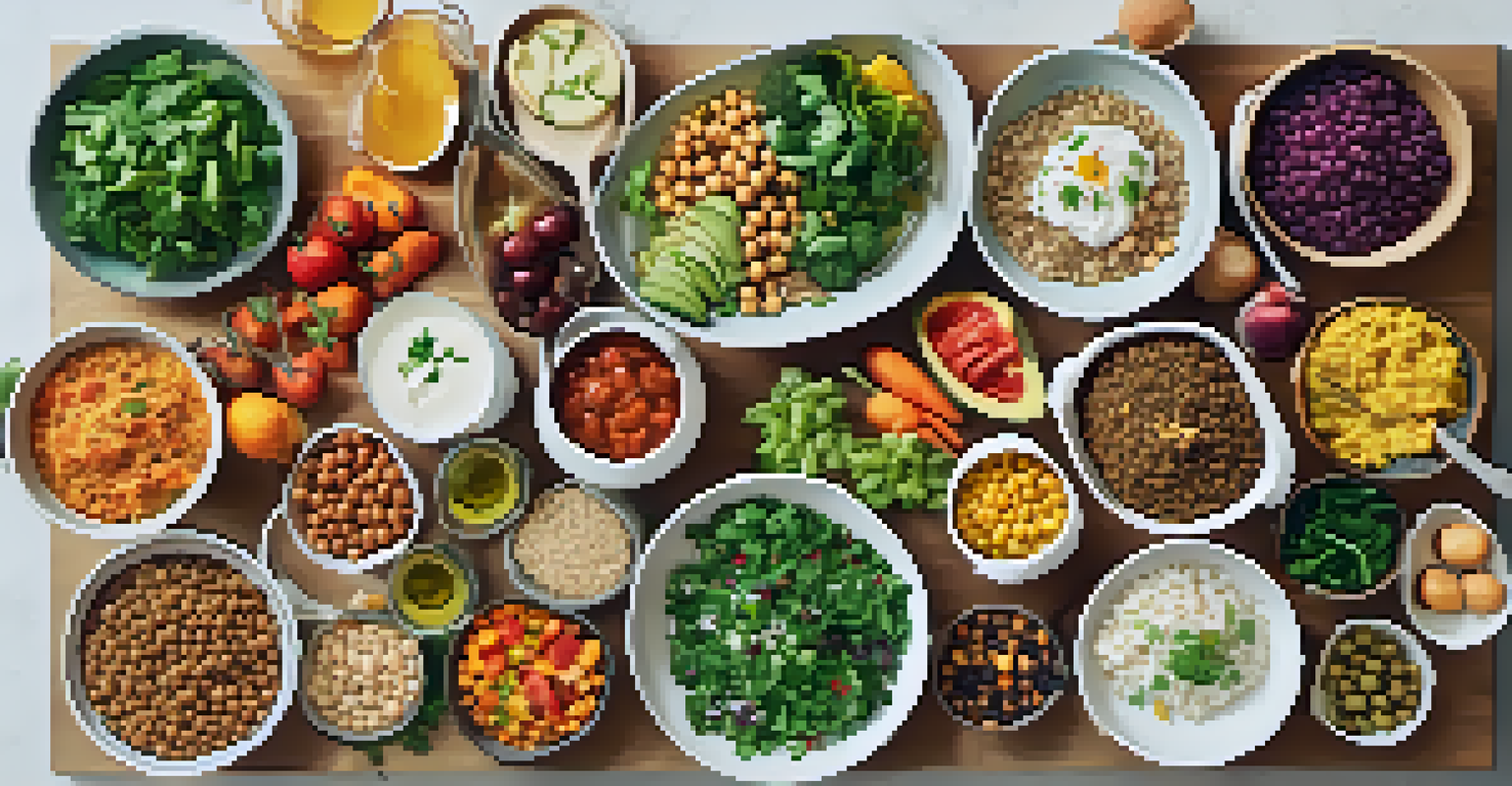The Science Behind Vegetarian Diets and Weight Loss

Understanding Vegetarian Diets and Their Variations
A vegetarian diet primarily excludes meat, but it can vary significantly. Some vegetarians eat dairy and eggs, while others follow a stricter vegan approach, eliminating all animal products. This variety allows for flexibility and personalization, making it easier for individuals to find a plan that suits their tastes and lifestyle.
You are what you eat, so don’t be fast, cheap, easy, or fake.
Different types of vegetarian diets can influence weight loss in unique ways. For instance, a lacto-vegetarian might enjoy creamy cheeses, while a pescatarian includes fish, which can be a good protein source. Understanding these variations helps you choose a diet that not only aligns with your ethical beliefs but also supports your weight loss goals.
Ultimately, the best approach is finding a balance that incorporates a range of plant-based foods, ensuring that you get all the necessary nutrients while keeping your meals flavorful and satisfying.
The Role of Nutrient Density in Weight Loss
One of the key advantages of vegetarian diets is their focus on nutrient-dense foods. Fruits, vegetables, whole grains, and legumes are packed with vitamins, minerals, and fiber while being lower in calories. This means you can eat larger portions without the worry of excessive calorie intake, making it easier to feel full and satisfied.

Fiber-rich foods like beans and whole grains can also enhance digestion and promote satiety. When you feel full, you’re less likely to snack on high-calorie, low-nutrient foods. This natural appetite control can be a game-changer in your weight loss journey.
Vegetarian Diets Offer Flexibility
Vegetarian diets come in various forms, allowing individuals to choose options like lacto-vegetarian or pescatarian that align with their preferences and lifestyle.
Incorporating a variety of colorful fruits and vegetables not only makes meals more enjoyable but also ensures you’re getting a wide range of nutrients that support overall health. The more vibrant your plate, the more likely you are to meet your nutritional needs while shedding pounds.
How Plant-Based Proteins Support Metabolism
Plant-based proteins, like those found in lentils, chickpeas, and quinoa, play a significant role in boosting metabolism. These proteins require more energy to digest compared to fats and carbohydrates, which can slightly increase the number of calories burned during digestion. This metabolic boost can contribute to weight loss over time.
The food you eat can be either the safest and most powerful form of medicine or the slowest form of poison.
Additionally, protein is essential for muscle maintenance. When you lose weight, it's crucial to retain muscle mass, as muscle burns more calories at rest compared to fat. By including sufficient plant-based proteins in your diet, you can support muscle health while losing fat.
Incorporating a variety of protein sources ensures you get all the essential amino acids your body needs. This not only supports muscle maintenance but also keeps you feeling fuller for longer, which helps prevent those pesky cravings.
The Impact of Eating Patterns on Weight Loss
Many vegetarian diets encourage mindful eating practices, which can significantly affect weight loss. By focusing on whole, unprocessed foods, individuals often find themselves making healthier choices. Mindful eating also involves being aware of hunger cues and savoring each bite, which can lead to a more satisfying eating experience.
Moreover, plant-based diets often lend themselves to more regular meal patterns, which can help stabilize blood sugar levels. When blood sugar levels are stable, you’re less likely to experience energy crashes or cravings for sugary snacks. This consistency can create a more sustainable approach to weight loss.
Nutrient Density Aids Weight Loss
Focusing on nutrient-dense foods in a vegetarian diet helps individuals feel full while consuming fewer calories, supporting effective weight management.
Creating a routine around meals and snacks, while incorporating plant-based foods, can help foster healthy habits that support long-term weight management. Feeling more in control of your eating habits can lead to better results on your weight loss journey.
The Psychological Benefits of Vegetarian Diets
Switching to a vegetarian diet can have positive psychological effects that indirectly aid in weight loss. Many people report feeling a sense of accomplishment and empowerment when making healthier food choices. This boost in self-esteem can lead to more motivation to stick to a weight loss plan.
Furthermore, aligning your diet with ethical beliefs can provide a strong sense of purpose. For instance, many choose vegetarianism for environmental or animal welfare reasons. This alignment can help reinforce commitment to the diet and contribute to healthier eating habits.
Additionally, the social aspect of vegetarianism can enhance motivation. Engaging with like-minded individuals, whether online or in local communities, can create a support system that encourages continued adherence to healthy eating patterns.
The Importance of Balanced Meal Planning
A common misconception about vegetarian diets is that they can be limiting or difficult to navigate. However, with proper meal planning, they can be both diverse and fulfilling. Planning meals in advance helps ensure a balance of nutrients, making weight loss easier and more sustainable.
Including a variety of food groups, such as fruits, vegetables, whole grains, and plant-based proteins, is essential for a well-rounded diet. This variety not only keeps meals interesting but also prevents nutritional deficiencies that can hinder weight loss.
Mindful Eating Enhances Results
Adopting mindful eating practices within a vegetarian diet can lead to healthier choices and better control over hunger, promoting sustained weight loss.
Creating a weekly meal plan can simplify grocery shopping and cooking, reducing the temptation to reach for unhealthy convenience foods. By having healthy meals ready to go, you're more likely to stay on track with your weight loss goals.
Challenges of Adopting a Vegetarian Diet for Weight Loss
While vegetarian diets offer many benefits for weight loss, they can also present challenges. One common issue is the risk of relying too heavily on processed vegetarian foods, which can be high in sugar and unhealthy fats. It’s essential to focus on whole foods to truly reap the benefits of a plant-based diet.
Another challenge can be ensuring adequate protein intake. Some vegetarians may struggle to meet their protein needs without careful planning. Being aware of this and incorporating diverse protein sources, like beans, nuts, and soy products, can help overcome this hurdle.

Lastly, social situations can pose difficulties for those following a vegetarian diet. Dining out or attending gatherings might present limited options. However, being proactive about discussing your dietary needs or bringing your own dishes can help you navigate these situations without compromising your weight loss efforts.
Conclusion: Embracing Vegetarianism for Effective Weight Loss
In conclusion, adopting a vegetarian diet can be an effective strategy for weight loss, provided it's approached mindfully. The focus on nutrient-dense foods, plant-based proteins, and mindful eating habits can make achieving your weight loss goals more attainable. By understanding the science behind these dietary benefits, you can create a plan that works for you.
Moreover, the psychological and social aspects of vegetarianism can bolster your motivation, making it easier to stick to your goals. With proper meal planning and awareness of potential challenges, you can navigate a vegetarian diet successfully.
Ultimately, whether you're considering a full transition to vegetarianism or simply incorporating more plant-based meals, the journey can lead to positive changes for both your health and the environment. Embrace the adventure of vegetarian eating and discover the benefits it can bring to your life!